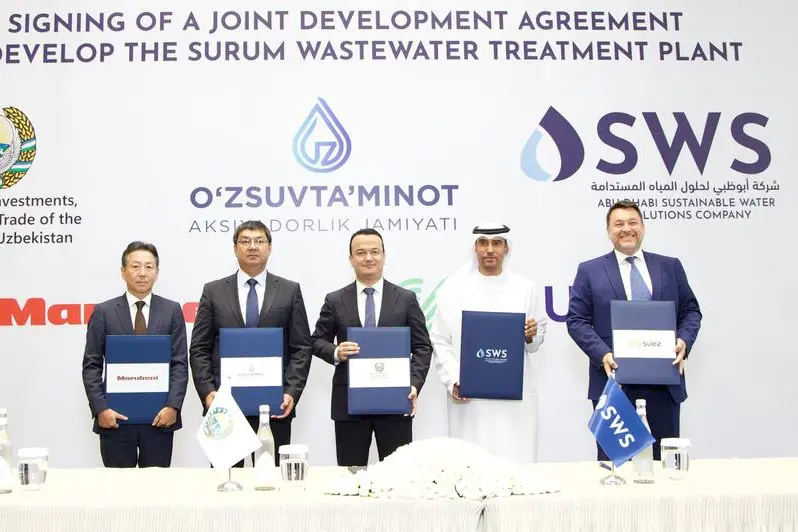PHOTO
Abu Dhabi: A strategic consortium comprising Abu Dhabi Sustainable Water Solutions Company (SWS), Marubeni Corporation, and Suez, has signed a joint development agreement with the Ministry of Investment, Industry and Trade of Uzbekistan, and Uzsuvtaminot JSC for the development of a wastewater treatment plant in Tashkent, Uzbekistan.
The project, which will be capable of producing 1.5 million cubic metres of treated water per day, is the largest of its kind in Uzbekistan and the wider Commonwealth of Independent States (CIS). The project, which is valued at more than US$1 billion, aims to reflect the strong bilateral collaboration between the UAE and Uzbekistan, supporting economic progress in the city of Tashkent and surrounding areas.
The agreement was signed in Tashkent by His Excellency Laziz Kudratov, Minister of Investment, Industry and Trade of Uzbekistan; Ahmed Al Shamsi, Managing Director and CEO of SWS Holding, and the Abu Dhabi Sustainable Water Solutions Company; Akhmad Suvankulov, Chairman of the Board at Uzsuvtaminot; and with SWS’ consortium partners, Kazuaki Shibuya, General Manager of Marubeni, Environmental Infrastructure Department; and Silvere Delaunay, CEO of CIS region at Suez.
The construction of the project is expected to begin in 2026, with the plant scheduled to become fully operational by 2030. Upon completion, the facility will serve approximately three million people in Tashkent and surrounding cities and replace the two existing wastewater treatment plants in Salar and Bektimir.
SWS, along with its partners Marubeni Corporation and Suez, will spearhead the development, financing, engineering, procurement, and construction of the wastewater treatment plant and sewer trunk lines, and will then manage the operation and maintenance of the plant for 25 years. Uzsuvtaminot JSC, as the public entity in Tashkent, will take over the operation of the new trunk sewer lines once commissioned.
His Excellency Laziz Kudratov, Minister of Investment, Industry and Trade of Uzbekistan, said: “This agreement follows the earlier signed Memorandum of Agreement, demonstrating the ongoing economic collaboration between the UAE and Uzbekistan, forging strong partnerships between entities and organisations, and developing crucial infrastructure projects that improve the quality of life for the people in Tashkent and by extension the CIS region. This project further exemplifies the shared commitment to achieving the United Nations Sustainable Development Goals (SDGs) that address priorities around Clean Water and Sanitation; Infrastructure; and Sustainable Cities and Communities.”
Ahmed Al Shamsi, Managing Director and CEO of SWS Holding, and the Abu Dhabi Sustainable Water Solutions Company, said: "Signing the joint development agreement with the Ministry of Investment, Industry and Trade of the Republic of Uzbekistan, and Uzsunvtaminot, underscores the mutual interest and commitment to strengthening the bilateral relationship between the UAE and Uzbekistan. The partnership demonstrates SWS’ unwavering commitment to providing sustainable water solutions at scale, and reaffirms our global expertise in developing, operating and managing large-scale wastewater treatment facilities efficiently and effectively. We look forward to continuing the close collaboration with our partners as we actively support the UAE’s contribution to enhancing socio-economic cooperation with Uzbekistan, and enabling the country to achieve long-term sustainable water security.”
Akhmad Suvankulov, Chairman of the Board at Uzsuvtaminot, said: “Our partnership with SWS underscores our mutual commitment to deepening collaboration between the UAE and Uzbekistan, nurturing stronger ties and common strategic objectives to ensure a secure and sustainable environmental solution. This project contributes to the realisation of Uzbekistan's economic development ambitions, and builds a prosperous future for the people of Tashkent, benefiting from our combined experiences and unwavering dedication to achieving sustainable progress for generations to come.”



















